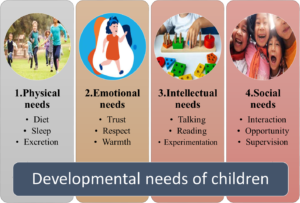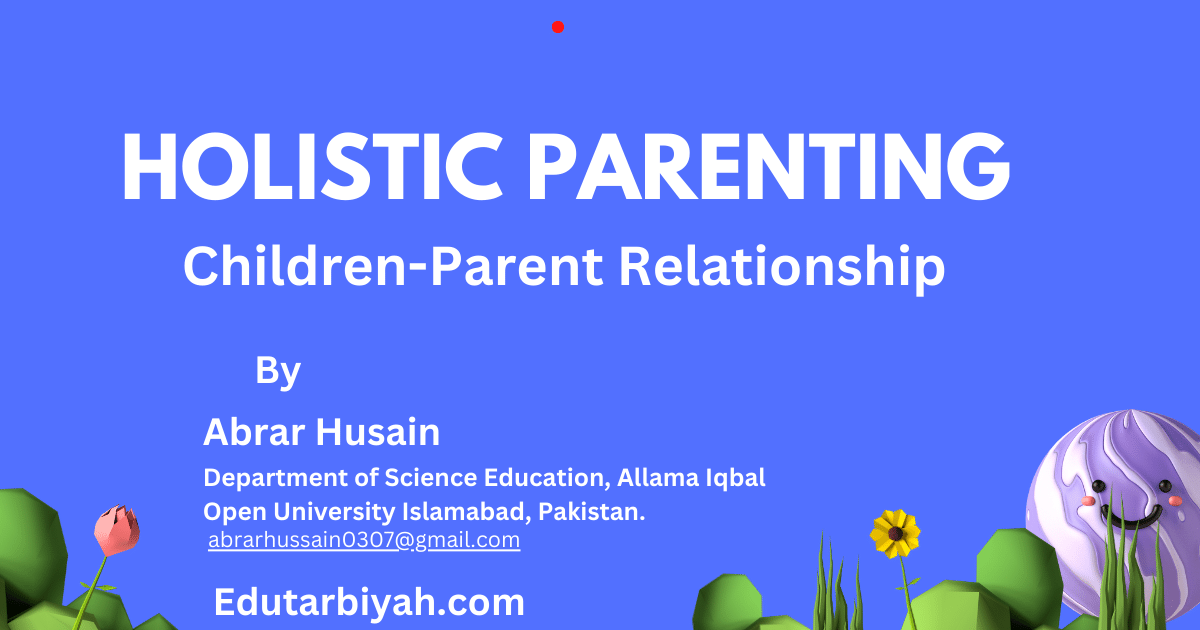Holistic Parenting –Children-Parent Relationship
Social interaction is one of the prime important factors that enables children to grow smoothly and gradually. This social interaction is achieved by living together, in the form of family. Family is the group of people in which social interaction starts from birth to death. In this unit of people, all the resident can share their thoughts, expressions, and activities with each other and can create huge opportunities for their proper grooming. In a family, relationships are maintained among all the individuals and thus, enable them to understand each other and share their opinions, which ultimately helps the children to learn in an easy and accessible way. Parents are considered the key pillar in the building of their children, they provide all the things to their children they need [1].
Children, below the puberty period are very needy for different life activities to their interactive people. It’s the time in which someone can change the mind, behavior, religion, ethics, etc. of the children and can mold them to their own way. In a family, the closer and more time giver to the children is their parents, who can sacrifice their single joy for the betterness of their child. It’s very obvious that some natural disasters happen, unexpectedly and unintentionally [2]. During disasters like floods, pandemics diseases, earthquakes, etc. the responsibilities of parents become more and it’s important to take care of their children in very polite and supportive ways. Unfortunately, during disasters it is observed that the parents fail to give proper care to their children due to multiple reasons, the financial status of the family, the availability of fewer resources, etc such compromised parenting behavior was recently observed in the COVID-19 scenario.
For the continuity of children-parent social interaction, it is important that the family provides all those substances, and sources which keep them alive. It’s the family that helps a lot in the socialization of a child, as life experiences and family relations play a key role in a healthy child’s development [2]. The interaction of children in their family becomes more important when the children are in their pre-school age as this age is considered the key and crucial developmental stage of children’s growth. It is also reported that this association of children in their family can affect the child’s personality either positively or negatively [3, 4]. Parents, children, and siblings combine to make a family. Every member in this system is dependent on others, especially when the individual is in their early stages. The individual can help in improving the psychological, social development, and personality development of each other, but can also provide shelter and protect them [5, 6]. In summary, the children-parent relationship is a unique and dominant relationship formed during the interaction of children with their parents [13].
Holistic Parenting Approaches
Holistic parenting in a broad sense is the mutual engagement between children and their parents to fulfill the basic needs, enhance the three Cs, and socialize their children [14]. This holistic approach is considered the most important approach to achieve the proper development of a child and make them more creative.
Needs of children
The needs of children are those things that are required for their proper growth, socialization, and character building. The prime responsibility of parents for their children is the development of three Cs, in their children. These include the development of Confidence, Creativity, and Character. These three basic needs are achieved by different approaches. Top among them is the fulfillment of the developmental needs of children. The developmental needs of children are categorized into physical needs, social needs, intellectual needs, and emotional needs. All these types have their own characteristics and properties. These needs and their properties are summarized in Figure 1.

Figure 1. Illustration of the developmental needs of children.
Parent’s responsibility
The responsibility of the parents is not only restricted to fulfilling the physical needs of their children, but they must take care of all the needs and try to fulfill them on time. Providing basic education to their children is also the parent’s responsibility. Parents can educate their children directly by teaching themselves or granting admission to schools or indirectly by various methods like providing open space for learning, giving them time for playing to learn from their friends, etc one of the most influential and best ways to educate the children, parents can ask questions from them like, what is this thing? If we do this work, how it will help us? Why do you do this? etc. [7]. The beginning five years of children’s development is very crucial for their personality and social development, therefore proper communication and relations with family or elders are the determining factors of this development [8]. Various kinds of psychological disorders may be produced in those children who are not given enough love, care, and family attention [9]. Such emotional problems may be determined by the superiority of the contact of child experiences at an early age. Parental characteristics like sensitivity, responsivity, pointing, success-oriented, good relationships and a loving personality can support children’s growth [10].
Children developing in a healthy, cooperative, and joyful family setting will make them understand things well, similarly, those children who don’t have such a friendly and healthy environment will face problems during their adaptation and development [11]. In the family, members sit together and try to find the possible way to every problem they face, this gathering can also affect the social, psychological, emotional, and physiological behavior of the child. Unexpected changes and astonishing programs taught by the family during their social life, unable children to analyze critical situations. The family may suffer from various life-threatening situations and may destroy their family balance, but this situation may also give a positive and dynamic solution to the existing problems and learned by their children [12].
Strategies to enhance the parent-children relationship
Parent-children relationships are enhanced by various methods. These methods range from small to large in terms of scope and from natural to artificial ways. The best way to strengthen this bond is to give time to the children which can exponentially enhance this bond. The top strategies that can help to strengthen this relationship are described below.
Time spending
It is well-known that children can learn more by observation and by doing than by teaching or listening. If the parents can spend more time with their children they will help them to learn more positive characters.
Love your children
It’s the love which can change everything. If the parents treat their children with love and polite way they will create and develop a caring potential in the children.
Give value to your children
It is reported that giving value to your children can make them more creative and help them to develop the act of responsibility. This is a very easy strategy and can easily achieved.
Give your children free time
If the parents provide some free time (time other than study etc.) to their children they can do what the children want. Such opportunities enable them to learn openly from their friends and society.
Opportunity of exercising
Children are more devoted to learning from some physical activities and from their friends. Let them to play and spend time with their friends that can help them to complete their physical needs.
Figure 2: Strategies to develop the bond of children-parent relationship.
Conclusion
In conclusion, the parent-children relationship is the bidirectional interaction that is developed for the proper growth, personality development, and creativity development of the children. Strong relationships can lead to more profound results and enable the children to learn more and improve their intrinsic characteristics. Time spending, care, love, attention, giving value, and trust are the top agents that are considered to strengthen this relationship.
 ایجوتربیہ بچوں کی اچھی تعلیم و تربیت
ایجوتربیہ بچوں کی اچھی تعلیم و تربیت



